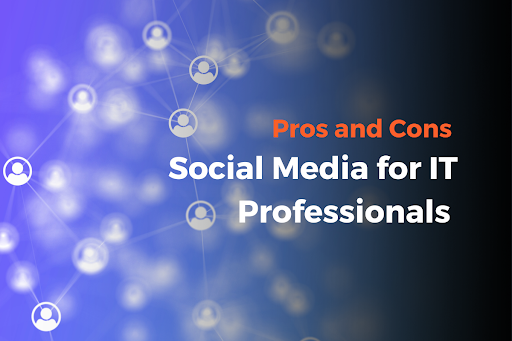Social media is not only a platform for entertainment and communication, but also a powerful tool for IT professionals. Whether you are a developer, a designer, a tester, or a manager, you can benefit from using social media to showcase your skills, network with peers, learn new technologies, and stay updated on the latest trends. However, social media also comes with some challenges and risks that you need to be aware of and manage effectively. In this article, we will explore the pros and cons of social media for IT professionals, and provide some tips on how to use it wisely and responsibly.
The Pros of Social Media for IT Professionals
- Build your brand. Social media allows you to create and share your portfolio, resume, blog, or website with potential employers, clients, and collaborators. You can also demonstrate your expertise and creativity by posting your projects, code snippets, designs, or solutions to problems. This can help you stand out from the crowd and attract more opportunities for your career.
- Expand your network. Social media enables you to connect with other IT professionals from different backgrounds, locations, and fields. You can join groups, communities, forums, or chats related to your interests, skills, or goals. You can also follow, comment, or message influential people, experts, mentors, or role models in your industry. This can help you build relationships, exchange ideas, get feedback, find mentors, or discover new opportunities.
- Learn new skills. Social media offers you access to a wealth of information, resources, and tutorials on various topics and technologies. You can follow hashtags, trends, or news to stay updated on the latest developments and innovations in your field. You can also watch videos, podcasts, webinars, or live streams to learn from experts or peers. You can also participate in online courses, challenges, hackathons, or contests to improve your skills or learn new ones.
- Share your opinions. Social media gives you a voice and a platform to express your thoughts, opinions, or perspectives on various issues or topics related to your field. You can also engage in discussions, debates, or polls with other IT professionals or users. This can help you showcase your personality, values, or passions, as well as gain insights, perspectives, or feedback from others.
The Cons of Social Media for IT Professionals
- Distraction and addiction. Social media can be very addictive and distracting, especially if you use it excessively or without a clear purpose. You may find yourself spending too much time scrolling, liking, commenting, or posting, instead of focusing on your work, projects, or goals. You may also experience information overload, stress, or anxiety from the constant exposure to notifications, messages, or updates. This can affect your productivity, performance, or quality of work.
- Privacy and security. Social media can expose you to various privacy and security risks, such as identity theft, phishing, hacking, malware, or cyberattacks. You may also unintentionally reveal sensitive or personal information, such as your location, contacts, passwords, or financial details, to malicious actors or third parties. You may also face legal or ethical issues if you violate the terms of service, policies, or regulations of your employer, client, or platform.
- Reputation and credibility. Social media can have a significant impact on your reputation and credibility, both positively and negatively. You may receive praise, recognition, or endorsement for your work, skills, or achievements, but you may also face criticism, backlash, or controversy for your opinions, actions, or mistakes. You may also encounter misinformation, fake news, or rumors that can damage your image or trustworthiness. You may also have to deal with trolls, haters, or bullies who may harass, insult, or threaten you or your work.
- Balance and well-being. Social media can affect your balance and well-being, both physically and mentally. You may experience eye strain, headaches, or fatigue from staring at the screen for too long. You may also develop poor posture, back pain, or carpal tunnel syndrome from sitting or typing for too long. You may also suffer from depression, anxiety, or low self-esteem from comparing yourself to others, feeling isolated, or facing negative feedback or pressure.
Tips on How to Use Social Media for IT Professionals
- Have a clear goal and strategy. Before you use social media, you should have a clear goal and strategy for what you want to achieve, learn, or share. You should also choose the platforms, channels, or tools that best suit your needs, preferences, or audience. You should also plan your content, schedule, or frequency of posting, and measure your results or outcomes.
- Be professional and respectful. When you use social media, you should always be professional and respectful, both in your content and your interactions. You should avoid posting or sharing anything inappropriate, offensive, or misleading. You should also respect the privacy, opinions, or rights of others, and avoid engaging in arguments, conflicts, or harassment. You should also acknowledge your sources, references, or inspirations, and give credit where credit is due.
- Be authentic and genuine. When you use social media, you should always be authentic and genuine, both in your content and your interactions. You should showcase your personality, values, or passions, but also be honest, humble, or transparent. You should also share your challenges, failures, or mistakes, as well as your successes, achievements, or solutions. You should also be open to feedback, suggestions, or improvement, and admit when you are wrong, or don’t know something.
- Be mindful and moderate. When you use social media, you should always be mindful and moderate, both in your content and your interactions. You should limit your time, frequency, or intensity of using social media, and prioritize your work, projects, or goals. You should also filter, verify, or evaluate the information, resources, or tutorials that you consume, and avoid misinformation, fake news, or rumors. You should also take breaks, relax, or disconnect from social media, and focus on your health, well-being, or hobbies.
Conclusion
Social media is a double-edged sword for IT professionals. It can offer many benefits, such as building your brand, expanding your network, learning new skills, or sharing your opinions. However, it can also pose many challenges and risks, such as distraction and addiction, privacy and security, reputation and credibility, or balance and well-being. Therefore, you need to use social media wisely and responsibly and follow some tips, such as having a clear goal and strategy, being professional and respectful, being authentic and genuine, or being mindful and moderate. By doing so, you can make the most of social media for your career, growth, or enjoyment.
Quote from Paulina Arredondo, marketing manager of Global Triangles:
“Social media is a great way to connect with your customers, partners, or prospects, and to showcase your products, services, or solutions. However, you also need to be careful about what you post, share, or comment, as it can affect your reputation, credibility, or trust. You also need to balance your time and energy between social media and your core tasks, and not let social media distract you from your goals or priorities.”
Quote from Pamela Walaski:
“Social media is becoming such an integral part of business operations that its use is now commonplace for product launches, developing consumer loyalty and sharing news.”
SME Paid Under

